Finding love in their parents’ arms is everything that homeless canines wish for.
Their hearts never stop glimmering with the hope that someday, their wish will come true. It’s that hope that helps them get through another day on the lonely streets.
Dobby was an adorable stray puppy who lived with that hope, too. She relentlessly wandered the streets in search of food and kindness that she needed.
One evening, her heart led her to the house of a couple who recently moved in. Despite feeling scared, the pup worked up some courage and paid them a visit.
A Sweet, Furry Surprise
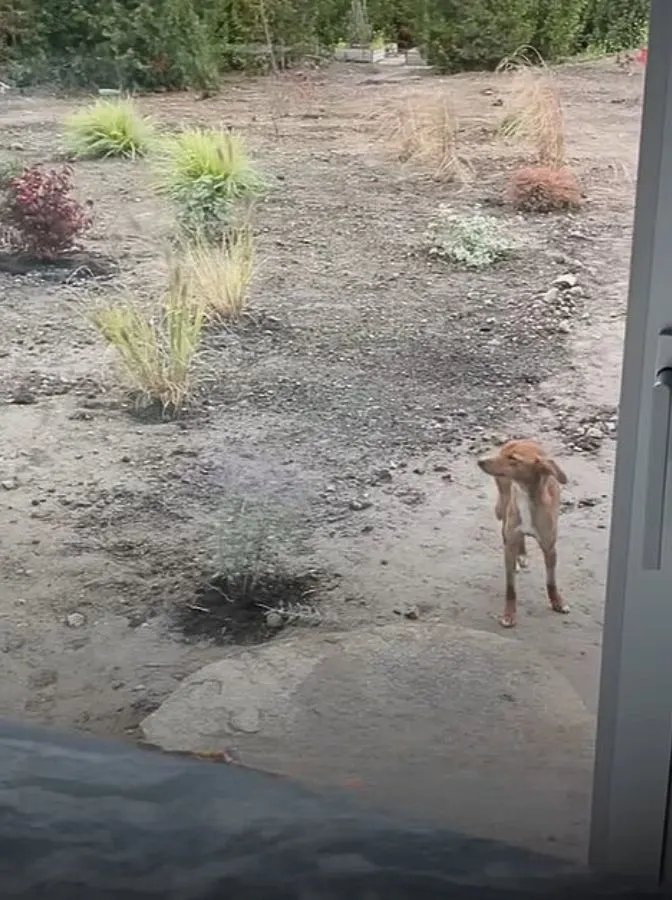
A week after Sydney and her partner moved into their new house, their security camera alerted them that there was someone in the back of their house. At first, Sydney thought it was a coyote and she rushed outside to check.
Her heart melted when she saw that it was, in fact, a skinny little puppy. She started talking to her, wishing to rescue her.
Although Sydney showed her kindness, the puppy was too frightened to accept the help she desperately needed, and she ran off.
Sydney kept expecting to see her again. After she realized that the puppy wasn’t coming back that night, she became sad.
Hoping To Rescue The Frightened Pup
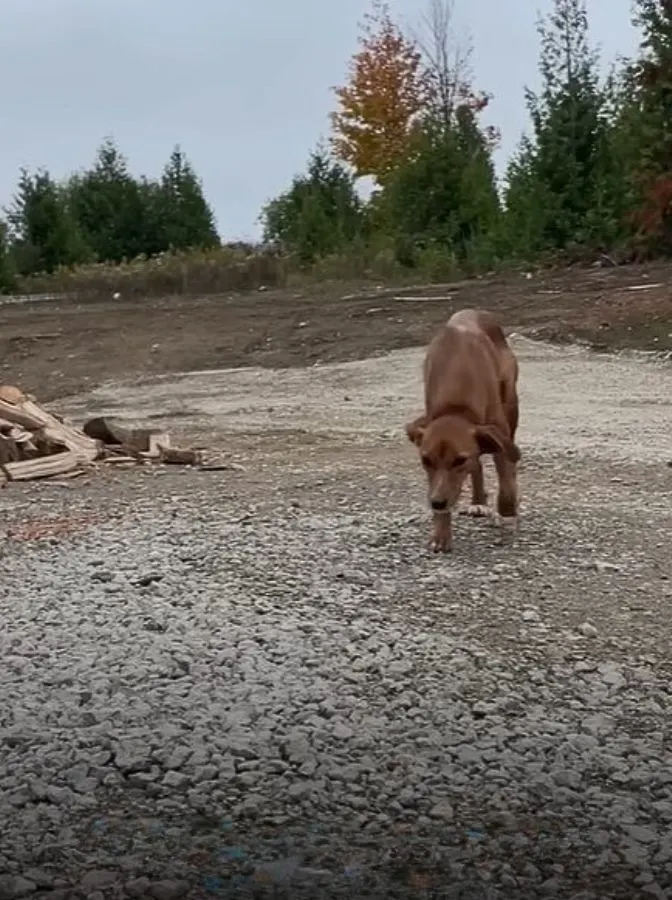
Feeling drawn to Sydney’s home, the adorable fur baby visited her again the next morning. When Sydney noticed that she was back, her heart was filled with joy.
Determined to rescue the little stray, she spent all day outside trying to gain her trust. She left food for her and prepared a crate.
The fur baby noticed Sydney’s efforts and she felt more relaxed. She kept circling around the house every 20 minutes. However, she wasn’t ready to be captured that day, and she took off again.
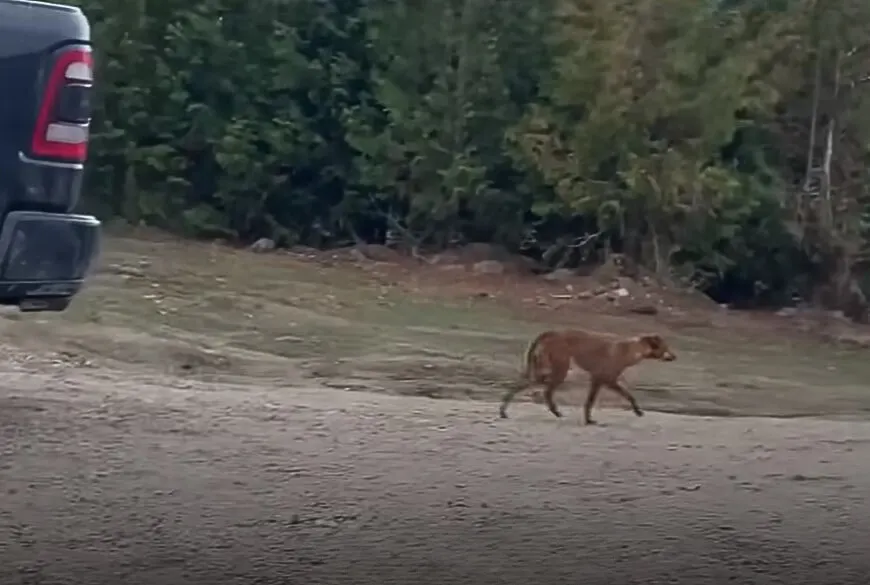
That night, Sydney heard a coyote howling in the distance and she felt frightened and worried for the puppy.
The next morning, she saw that the coyote was chasing the stray pooch. Sydney scared the coyote off. She knew she had to rescue the pup as soon as possible.
In the evening, the couple’s neighbours captured the little canine and brought her to the couple’s house.
Feeling The Warmth And Comfort Of A Home
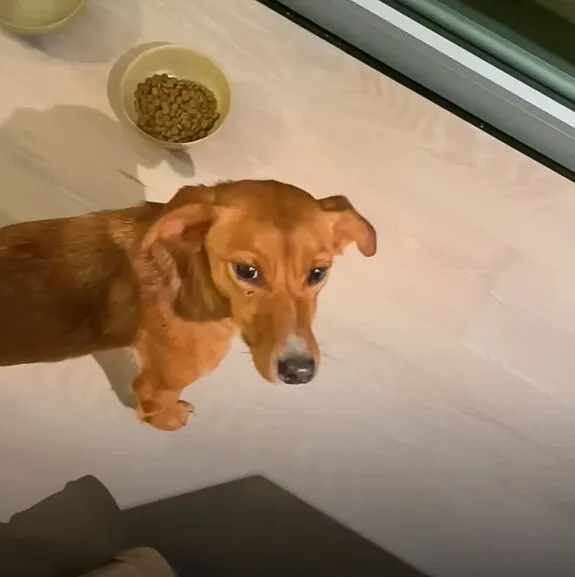
The puppy was happy to spend the night in a warm home. She finally felt at ease after a long time. She knew that she had chosen the right house.
Her rescuers were enchanted with her and felt relieved that she was no longer on her own.
The couple took the canine to the rescue. The staff scanned her, but found no microchip. After determining that the delightful baby didn’t have owners, Sydney and her husband gave her a forever home. They named her Dobby.
The only thing they worried about was how Gary, their Frenchie, would react to having a sibling. Soon, they sighed in relief after they realized that Dobby had captivated Gary’s heart, too.
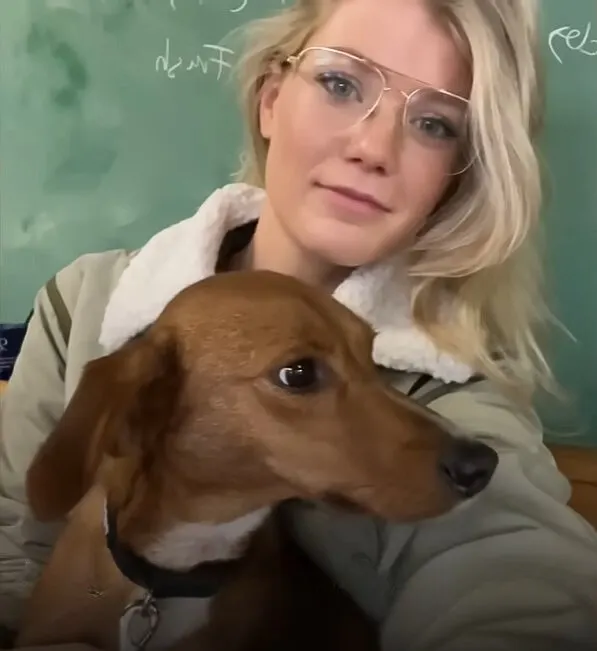
“I was shocked at how much they have become best friends and how much they really love hanging out with each other,” Sydney told The Dodo.
The siblings snuggled with each other all the time.
Dobby became a loving member of their family. The puppy couldn’t contain her happiness. She enjoyed cuddling with her parents on the couch, soaking up all their love.
“She is just part of the family now, and it feels super normal. Feels like she’s been here forever,” she added.
The couple believe that Dobby was destined to find them and they are over the moon that the fur baby chose their house.



Whenever they see her looking out through the window, they remember how much Dobby’s life changed.
She used to be a hungry and frightened stray who desperately needed some love and care. Now, she gets showered with love and she enjoys the wonderful view while sitting on a couch in a cozy home.
If you’ve noticed your furry friend turning up their nose at mealtime, it can be concerning. As a seasoned dog trainer, I understand the worry that comes with a picky eater. A dog’s reluctance to eat can stem from various reasons, some more common than others. It’s essential to pay attention to your pup’s eating habits as they can be indicators of their overall well-being.
When your canine companion starts to show disinterest in their food, it’s crucial to address the issue promptly. As a dog owner, you play a vital role in ensuring your pet’s health and happiness. Stay tuned to discover the possible reasons behind your dog’s decreased appetite and how you can help them get back to enjoying their meals.
Understanding the Problem: Why Isn’t My Dog Eating?
Exploring Common Reasons for Loss of Appetite in Dogs
If your dog isn’t eating as usual, it’s essential to consider a few common reasons for this change. Firstly, dental issues, such as tooth decay or gum disease, can make eating painful for your furry friend. Secondly, recent vaccinations or medications can sometimes cause temporary loss of appetite. Lastly, changes in routine, stress, or a new environment may also impact your dog’s desire to eat.
Recognizing When It’s Time to Worry
While occasional fluctuations in your dog’s appetite are normal, persistent refusal to eat can be a cause for concern. If your dog doesn’t eat for more than a day or shows other concerning symptoms like lethargy, vomiting, or diarrhea, it’s time to seek veterinary advice. Remember, your dog’s well-being is a top priority, so prompt action is key to addressing any underlying issues.
Health-Related Causes of Appetite Loss
Dental Issues That Can Affect Eating
When your dog experiences dental problems like a toothache or gum disease, it can make eating painful. Imagine trying to chew with a sore mouth—it’s uncomfortable and can lead to your dog avoiding food. Keep an eye out for symptoms like bad breath, swollen gums, or difficulty eating hard food.
Serious Medical Conditions to Consider
Sometimes, a loss of appetite in dogs can signal more severe underlying health issues. Conditions such as infections, organ failure, or cancer might be causing your dog’s lack of interest in food. If your dog’s appetite doesn’t improve or if other symptoms like weight loss or lethargy appear, it’s vital to consult your vet promptly for a thorough examination.
Remember, understanding the reasons behind your dog’s decreased appetite, whether due to dental problems or more serious health issues, is crucial for ensuring your pet’s well-being. Regular dental check-ups and keeping an eye on your dog’s overall health can help prevent appetite loss and keep your furry friend happy and healthy.
Psychological Factors That Influence a Dog’s Eating Habits
Stress and Anxiety as Appetite Suppressants
If your dog is feeling stressed or anxious, it can lead to a decrease in appetite. Just like humans, dogs can also be affected by psychological factors that impact their desire to eat. Stressful situations such as loud noises, changes in the household, or being left alone for extended periods can all contribute to your dog not eating as usual. Pay attention to your dog’s behavior and try to identify any possible sources of stress that may be affecting their appetite.
The Impact of Environmental Changes
Changes in your dog’s environment can also play a significant role in their eating habits. Moving to a new house, introducing new pets, or even rearranging furniture can disrupt your dog’s routine and cause them to lose interest in food. Dogs thrive on stability and familiarity, so sudden changes can lead to a lack of appetite. Be mindful of any changes in your dog’s environment and try to maintain a consistent and comfortable setting to help them feel secure and more inclined to eat.
Nutritional Concerns and Food-Related Issues
Assessing Your Dog’s Diet for Potential Problems
When your dog isn’t eating as usual, it’s essential to take a closer look at their diet. Check the quality of the food you’re providing. Low-quality or expired food can deter your dog from eating. Ensure that the food meets their nutritional requirements. Sometimes, a simple change in the type or brand of food can reignite their appetite.
If your dog’s diet consists mainly of human food, this could pose a problem. Human food may lack essential nutrients required by your dog. Stick to a balanced canine diet to keep them healthy and satisfied. Inconsistencies in feeding times or amounts can also impact your dog’s eating habits. Establish a regular feeding schedule to help regulate their appetite.
The Role of Palatability and Food Preferences
Palatability plays a significant role in your dog’s eating habits. Some dogs may be pickier eaters and prefer certain flavors or textures. Experiment with different types of dog food to find what your furry friend enjoys the most. Wet food, dry kibble, or a mix of both can cater to your dog’s preferences.
Consider the temperature of the food as well. Some dogs prefer warm meals, while others enjoy colder options. Pay attention to your dog’s reactions to different foods to understand their preferences better. Mixing in a small amount of healthy toppings like cooked vegetables or a bit of meat can enhance the taste and make the meal more enticing for your dog.
How to Encourage Your Dog to Eat
Tips for Stimulating Your Dog’s Appetite
Here are some simple yet effective ways to stimulate your dog’s appetite:
- Maintain a Consistent Feeding Schedule: Stick to regular feeding times to establish a routine for your furry friend.
- Ensure a Quiet Feeding Environment: Create a calm and quiet space for your dog to eat without distractions.
- Add Tasty Toppings: Sprinkle a small amount of broth or shredded cheese on your dog’s food to enhance its flavor.
- Try Different Food Textures: Experiment with wet and dry food to see which texture your dog prefers.
- Engage in Regular Exercise: Physical activity can help boost your dog’s appetite, so make sure they get enough exercise daily.
- Avoid Giving Excessive Treats: Limit the number of treats you give your dog throughout the day, as this can reduce their interest in their regular meals.
When to Consult a Veterinarian for Feeding Assistance
If your dog continues to show disinterest in food despite trying the above tips, it might be time to consult a veterinarian. Consider seeking professional advice if:
- Your dog refuses to eat for more than 24 hours.
- There are other concerning symptoms accompanying their loss of appetite.
- Your dog has a sudden change in eating habits without any apparent reason.
Remember, your veterinarian is the best person to provide guidance on your dog’s nutrition and health.
Conclusion
So, if your dog isn’t eating, remember to consider various factors like dental issues, stress, or health conditions. It’s crucial to monitor your furry friend’s diet and make adjustments as needed. Experiment with different foods, textures, and feeding routines to stimulate their appetite. Keep meal times consistent and create a calm eating environment. Don’t forget to consult your vet if the problem persists or if there are other concerning symptoms. Your pup’s well-being is a top priority, so stay attentive and proactive in addressing their eating habits.
Frequently Asked Questions
Why is my dog not eating?
Loss of appetite in dogs can be triggered by various factors, including dental problems, stress, medication side effects, changes in routine, or underlying health issues. It’s crucial to monitor for other symptoms and consult a veterinarian if the problem persists.
What food-related issues could be causing my dog’s decreased appetite?
Issues like food quality, nutritional imbalances, feeding inconsistency, or even food preferences may lead to a dog’s decreased appetite. Evaluating the diet, trying different foods, adjusting feeding routines, and ensuring a balanced diet can help improve their interest in eating.
How can I stimulate my dog’s appetite?
Stimulating your dog’s appetite can involve maintaining a routine feeding schedule, offering a quiet eating environment, adding tasty toppings, experimenting with various textures, engaging in regular exercise, and limiting excessive treats. If appetite issues persist, seek advice from a veterinarian promptly.
[no_toc]


Hey there, I’m Janet Brooks, a dog-loving student from California. I’m all about helping pups in need, especially those without homes. Me and my awesome friends work together to give shelter and love to stray dogs. Oh, and I also write blogs about dogs to share helpful info.